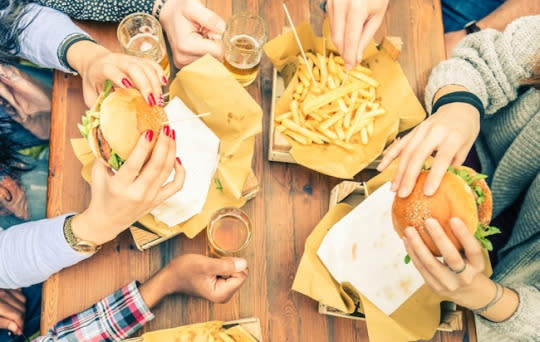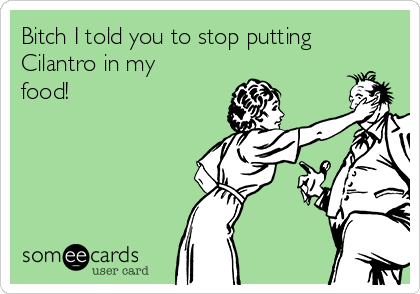A Lot of Food Is Contaminated with Poop—but How Hazardous to Your Health Is It?

Sure, it’s gross, but will it make you sick? (Photo: Shutterstock)
It seems like the food industry’s been getting into a lot of, well, sh*t lately. Between reports that all hamburger meat contains traces of poop to the poop-infested cilantro incident that made us rethink our guac obsession, you’d think that hazmat suits would be trending. Food production is a huge industry, so it’s (unfortunately) impossible for producers to avoid contamination 100 percent of the time—but don’t go on a germaphobe rampage just yet, say experts.
While the thought of stuffing your face with foods that are laced with poop bacteria is enough to make anyone gag, the odds of it happening are extremely low. There are uber-strict guidelines in place for the food industry called Good Manufacturing Practices (GMP), which outline acceptable and unacceptable practices within a food production setting, says Angela M. Shaw, Ph.D., assistant professor of food science and human nutrition at Iowa State University. If a food contains traces of fecal matter, it’s because of food-safety management issues within a particular company that isn’t following proper GMP.

Because the rules and regs are super-strict on every level, the icky cases of cross-contamination we hear about are usually linked to unforeseen circumstances—and can happen at any time during the production process. “Animal or human fecal contamination of the fresh produce food supply can occur when there are breakdowns in sanitation and hygiene practices on farms or during packing and processing,” says Michele Jay-Russell, Ph.D., food-safety specialist at the Western Institute for Food Safety and Security at the University of California, Davis. “For example, produce is usually grown in open fields and orchards that aren’t sterile. Wild animals, like deer, birds, or rodents, may enter fields or waterways and spread bacteria or parasites to fruits, nuts, and veggies.”
Fertilizers that contain animal manure can also spread germs to produce fields if it hasn’t been composted properly. Meanwhile, pathogens can enter raw animal products—like raw meats, poultry, and unpasteurized milk—if poop is spread during slaughter or milking, and human poop can spread disease if food workers or consumers don’t wash their hands properly, adds Jay-Russell. While foods do go through a vigorous washing process, some bacteria may still survive and attach itself to the food. If the number of bacteria cells reach a dose capable of making someone sick, a foodborne illness may strike after chowing down. (You know, not to freak you out or anything.)
According to the Centers for Disease Control and Prevention (CDC), raw foods that come from animals are most likely to be contaminated by poop bacteria, such as raw meat and poultry, raw eggs, unpasteurized milk, and raw shellfish. Foods that pool products together from many individual animals are of particular concern because a pathogen in one animal can contaminate the entire batch. For example, one hamburger may contain meat from hundreds of animals, one restaurant omelet may contain eggs from hundreds of chickens, and a glass of raw milk may contain milk from hundreds of cows. Fruits and veggies are also challenging to keep safe: Washing can decrease contamination but not get rid of it entirely, while entire boxes of produce can be contaminated if washed with water that isn’t clean. Raw sprouts are the trickiest since they grow in an environment that pathogens love and they’re eaten without being cooked further.
Sure, the odds of steering clear of contaminated foods entirely are slim-to-none, but don’t fret: “We have one of the safest food supplies in the world, so it’s highly unlikely for feces to be in our food,” says Shaw. For those just-in-case moments, there are core practices you can follow to protect yourself. First up, buy foods from reputable sources that are properly licensed and inspected, says Jay-Russell. “Government agencies regulate produce [the FDA] and meats/poultry [the USDA], as well as state and local departments,” she says. “The regulations include requirements for farmers to keep fecal material from entering the food supply to prevent the spread of pathogens.”
Both during and after grocery shopping, keep fruits and veggies separate from meat, poultry, and fish to prevent cross-contamination, suggests Jay-Russell. Always wash your hands with hot, soapy water for at least 20 seconds before and after handling food. Wash fruits and veggies under running water, and make sure your foods are always cooked or warmed up above 140 degrees Fahrenheit. (According to the CDC, bacteria that causes food poisoning multiplies quickest in the “danger zone” between 40 and 140 degrees.) Finally, thoroughly scrub the prep areas of your kitchen, such as the sink, cutting boards, and knives, on the regular. This will help to keep pesky bacteria to a minimum.
More from Women’s Health:
The Scary Mental Health Risks of Going Meatless
Why Doesn’t the FDA Consider Salmon, Avocados, or Almonds Healthy?
Here’s How Much Mouse Poop, Maggots, and Cigarette Butts the FDA Allows in Your Food
The World Health Organization Just Declared Processed Meats Carcinogenic
Disturbing News About What’s in Your Spinach
By Krissy Brady
